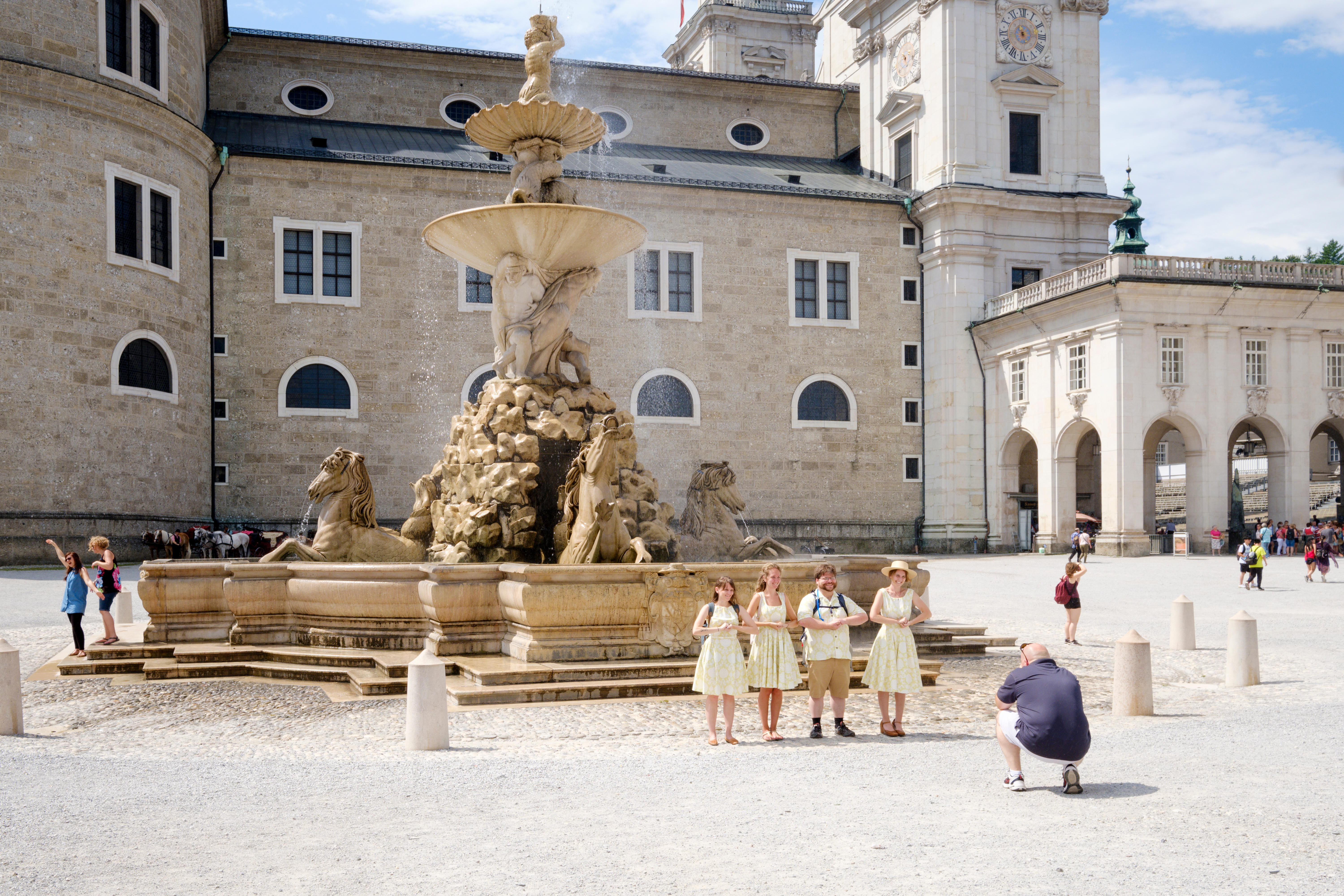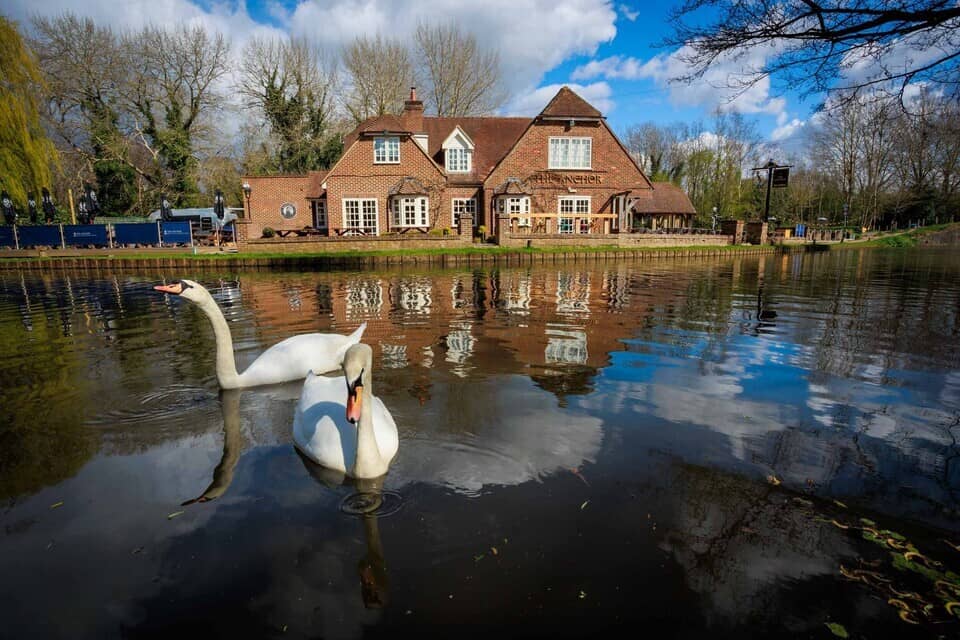-
AAPL
155.81 (-0.01%)
-
BARC-LN
1.6864 (+0.04%)
-
NKE
105.74 (0.00%)
-
CVX
157.85 (+0.01%)
-
CRM
153.69 (+0.00%)
-
INTC
31.22 (-0.02%)
-
DIS
111.2 (-0.01%)
-
DOW
49.31 (-0.01%)
Millions more blown on parliamentary pantomime
Whether it’s crumbling rooftiles, weekly fire alarms being activated or bacteria in the water supplies, the creaking Palace of Westminster is all too often a perfect state-of-the-nation parable. Everyone agrees that the place needs fixing: the question is, should MPs move out to allow restoration projects to happen unencumbered?
It’s currently costing an extra £2 million a week to keep the Houses of Parliament functioning while MPs decide what to do: in 2018 they voted for a ‘full decant’ to leave while works went on but in 2020 that decision was subsequently overturned, meaning that millions spent on new temporary sites has likely gone to waste. Some £70 million for a ‘stand-in’ chamber in Richmond House was written off in September while a further £10.9 million to move peers to the QEII centre was blocked by the government.
The overall ‘Restoration and Renewal’ program has been overseen by a Sponsor Body that has endured a somewhat chequered history since it properly launched in 2020. Having concluded that a ‘full decant’ was the only option, the panel of politicians and building experts were subsequently asked to review their findings. After concluding once again that moving out was the only solution, the House of Commons Commission moved to, er, abolish the Body.
Now Mr S has discovered just how much all these shenanigans has cost the great British taxpayer. For, tucked away in a Commission report last week was a breakdown of the costs of the Body which is soon to be wound up. Between 2020 and 2022 some £24.4 million was spent on it: in 2022/23 a further £7 million is budgeted too. Some of this £31 million covers personnel who will retain jobs under the new system but millions more risks being wasted on an expert body that was abolished because MPs didn’t like what they were being told.
Dr Alexandra Meakin of Leeds University said to Mr S that:
More than £100 million has now been spent and still no restoration has been yet agreed. With politicians procrastinating as the Commons crumbles, will anything change in future? Steerpike isn’t holding out hope…
Are rail strikes the start of a summer of discontent?
This morning, the UK woke up to the largest rail strike in thirty years. As many as 50,000 workers are striking, with just one in five trains running across the country. Commuters have been told to work from home or travel by other means while stations are deserted.
This scenario is one that Brits will have to get used to. The RMT rail union is to strike again on Thursday and Saturday and has vowed to continue striking for ‘as long as it takes’ to get the 7 per cent pay rise it demands. The RMT argue that the 3 per cent rise offered by Network Rail does little to plug the gap caused by rising inflation and the cost of living crisis.
There really does seem no end in sight. At least not a swift one.
The strike has been timed to cause maximum damage: children are currently sitting GCSEs and A Levels for the first time in three years, Glastonbury music festival begins on Wednesday. Petrol prices are at an all-time high. But then again, what better way to get people to sit up and listen than to make their lives as inconvenient as possible.
There really does seem no end in sight. At least not a swift one. The cost of living crisis is not going to be brought to heel any time soon. It’s perfectly reasonable that rail workers are demanding higher wages: just in February Boris Johnson came out swinging against Bank of England boss Andrew Bailey for suggesting otherwise.
Now the government has backed down from that position. This morning on Sky News Transport Secretary Grant Shapps washed his hands of the matter and said it was for Network Rail and RMT to sort this mess out. RMT union boss Mick Lynch has said the government has prevented employers from negotiating freely.
The trouble is, while they are hammering it out, the rest of the country has to suffer. Without a functioning rail network, many parts of the country are suddenly very badly connected. That makes it hugely difficult for many to get to work or school. It’s more expensive than ever to fill up a car. More cars on the road puts pressure on the emergency services.
It’s not just rail workers either. There are reports that doctors, nurses, care workers, teachers and even criminal barristers on legal aid fees are considering, or have already decided, to strike over low pay.
The Sun newspaper suggested on its front page yesterday that Britain is going back to the 1970s. It’s hard to disagree. We see spiralling inflation and paralysing strike actions. The fear is that, in a society still emerging from a pandemic, this time could be worse.
Is Britain heading into a wage-price spiral?
Are wages about to spiral out of control? Boris Johnson certainly thinks there’s a risk. Last week he warned that the economy was ‘steering into the wind’ and that the UK could be entering a 1970s-style malaise.
With inflation shooting up to 9 per cent – and expected to go higher still – rail workers are embarking on the first of three days of industrial action today, demanding a minimum pay rise of 7 per cent. Network Rail has offered just 2 per cent, with the potential for an extra 1 per cent on top if they can meet productivity targets later this year. Barristers too have voted for a walkout, and teachers and doctors are threatening to join the strikes. Speak to people in Westminster and there is a prevailing sense that there is only one way to stop runaway inflation: keeping wages down.
The wage-price theory is simple enough: higher costs mean workers demand higher pay, higher pay then pushes prices further upwards, and a vicious circle ensues. The theory is predicated on a couple of factors, one being a tight labour market, which allows workers greater leverage in negotiating more pay. With unemployment currently at 3.7 per cent and job vacancies at a record high of 1.3 million, that condition has certainly been met. Another is that wage growth exceeds productivity growth – otherwise, businesses would be able to absorb the rising cost of labour without having to pass on price rises to their consumers. Again, that condition has been met: growth is so stagnant that there are now even fears of a recession. The final condition is that workers and employers expect inflation to stay high. If it were transitory, businesses might feel able to weather the storm without having to push up prices, potentially making them uncompetitive.
The Bank of England certainly thinks inflation is transitory. According to the Bank, inflation should be back to 2 per cent by June 2024, predicated on the assumption that energy prices fall back down to normal levels soon. It’s a huge gamble (the Bank has called it wrong before) and relies on western allies such as Saudi Arabia agreeing to play ball when it comes to pumping more oil (hence why Biden is visiting the Gulf state next month).
One criticism of the spiral theory, put forward by economists such as Grace Blakeley, is that because UK inflation is largely imported – caused by that spike in energy prices and post-Covid disruptions to shipping – the spiral won’t get going in the first place. But you have to think about it from the position of businesses: their costs are going up, for whatever reason, and if workers add to those costs by demanding higher pay then their only option is to raise the price they set for their goods. It doesn’t really matter why, for example, raw materials are getting more expensive, the problem is that costs are going up full stop.
Such arguments also fail to account for a major culprit that has stoked inflation at home: money printing. As Mervyn King, the former governor of the Bank of England, has said, ‘The problem was that central banks… put a lot of money into the system.’ Post-2008 quantitative easing went to balancing government books; pandemic printing has been funnelled into the wider economy through furlough, loans, support packages and the rest.
And then there’s the sheer amount of printing that took place: the UK printed nearly £500 billion during the pandemic, nearly twice what it had printed between 2008 and 2020. Meanwhile, consumers weren’t spending nearly as much during the lockdowns (as many as 85 per cent of UK adults reduced their spending when the country shut down). In the US, demand was boosted even further with a series of stimulus cheques sent out to every American. The result, when we finally did reopen, was an overheated global economy.
This is perhaps why the UK government hasn’t got involved in the rail workers pay dispute. They know that Network Rail is unable to meet the wage demands – subsidies tripled to £12 billion during the pandemic to make up for the huge fall in revenue – and the government doesn’t want those demands to be met anyway. The result is pain, both in people’s pockets and in disruption to services. The gamble is that it will save more pain in the longer term.
Tories beat inflation with glitzy ball
The cost-of-living crisis might be gripping the country but there was no sign of that at the Tories’ summer party last night. Held in the sumptuous setting of Kensington’s Victoria & Albert Museum, the party put aside its various troubles for one night at least – not least claims about a potential conflict of interest for party co-chair and V&A trustee Ben Elliot.
Well-heeled attendees such as property tycoon Nick Candy and his wife singer Holly Vallance were forced to run the gauntlet after dozens of workers from the Public and Commercial Services Union and John McDonnell turned up to picket the event. Culture Secretary Nadine Dorries was booed upon her arrival while former investment banker Lubov Chernukhin clearly hasn’t let past controversies trouble her as the largest female political donor in history marched in flashing smiles.
Inside the soirée, there was no sign of any belt-tightening as more than 200 guests tucked into fine cuts of beef, salmon tartare and passionfruit meringues with lashings of red. Premium tables for ten went for £20,000 each; standard ones for £12,500, with guests sharing pictures of the glamorous bash on Instagram. Priti Patel, Liz Truss and Sajid Javid were among those who attended the evening. But the star of the night was undoubtedly Boris Johnson who, hours after his hospitalisation with a minor sinus problem, showed up for a short spell, snapping pictures and swapping jokes with attendees.
And it’s a good thing that the Tory leader is back on form, judging from much of the excited talk about one of the auction items with which he is involved: a meal with David Cameron and Theresa May, dubbed ‘the dinner of the century’. That went for a cool £120,000: an impressive sum, though still someway off the £300,000 which donors paid to have the first dinner with Johnson after he became PM in July 2019.
A CCHQ spokesman told Mr S: ‘Fundraising is a legitimate part of the democratic process. The alternative is more taxpayer-funding of political campaigning, which would mean less money for frontline services like schools, police and hospitals – or else, being in the pocket of union barons, like the Labour Party.’
Other items included a trip to South Africa, shooting in Market Harborough and a visit to Chelsea versus Arsenal. Talk about being a glutton for punishment. Still, it’s the prospect of dining with Johnson and the two predecessors he helped defenestrate which really makes for sobering thought. Let’s just hope he’s still PM by the time it actually gets held…
There’s more to Salzburg than The Sound of Music
Returning to Salzburg last week, for the first time since Covid, I’d almost forgotten what a beautiful city this is. I’ve been here umpteen times, but each new arrival takes my breath away. An ornate cluster of domes and spires, set against a backdrop of snowcapped peaks, it’s implausibly picturesque, like the setting for a movie – which is apt, because for most Britons it’s still synonymous with that kitsch classic, The Sound of Music.
Salzburg does have its schmaltzy side, but it’s also a highly sophisticated place, a city of classical music and antiquities, and it’s this blend of highbrow and lowbrow which makes it so appealing. You can go hiking in the hills and spend the evening at the opera, or you can sit in a Biergarten beneath an old chestnut tree and simply watch the world go by. I could drone on and on about how lovely it is – how in winter those spires and domes are draped with snow, how in summer they glint and sparkle in the sunlight – but I’ll spare you the flowery prose. Instead, here’s a how-to guide. I hope it inspires you to come here. Like any great work of art, Salzburg isn’t something you want to keep to yourself.
Getting there

Salzburg’s neat little airport is only a few miles from the city centre, but the range of flights is pretty finite. Ryanair fly here from Stansted, but I prefer to fly to Munich and travel on to Salzburg by train (BA fly direct from Heathrow; Lufthansa fly from Heathrow, Birmingham and Manchester). It’s fun to stop off in Munich, but it’s just as easy to travel straight on to Salzburg. From Munich airport it’s only two hours 20 minutes (with one easy change) to Salzburg’s central station. This summer the journey costs only €9 return on a Deutsche Bahn 9-Euro-Ticket (details from www.bahn.de).
Where to stay

I’ve stayed in half a dozen hotels in Salzburg over the years and I’ve never been disappointed. On previous visits, my favourites were the Blaue Gans, a chic boutique hotel in the Altstadt (old town) and the Auersperg, a friendly family-run four-star in the Neustadt (new town). This time, I split my stay between Hotel Goldgasse and Schloss Leopoldskron and it felt like the best of both worlds. Hotel Goldgasse is a stylish hideaway in a medieval alley in the heart of town; Schloss Leopoldskron (the von Trapp residence in The Sound of Music) is a baroque palace beside a leafy lake on the edge of town. The Schloss, the lake and the surrounding gardens are idyllic, but this isn’t a grand hotel, and though the communal areas are palatial, the bedrooms are refreshingly plain.
Getting around
Despite its monumental centre, befitting a sprawling metropolis, Salzburg is a compact city with only 150,000 inhabitants. So long as you’re fairly fit you can do virtually everything on foot. The reason the city centre is so grand is because of its eccentric history. An ecclesiastic city state, ruled by bishops rather than monarchs, it sidestepped the internecine wars that devastated Early Modern Europe, and during the Counter-Reformation its Catholic rulers rebuilt its medieval centre as an Alpine version of Vatican City.
After Napoleon was vanquished, Salzburg became part of Austria, but the Austrians had little use for it. Bypassed by the Industrial Revolution, it became a cultural capital, renowned for its rich musical heritage. It was bombed during the Second World War, but mercifully its antique core escaped more or less unscathed.
The Salzburg Festspiele, one of the world’s greatest festivals of classical theatre and orchestral music, is the main summertime attraction, but there’s lots to see and do at any time of year. The Altstadt has the most flamboyant architecture, but the Neustadt is equally attractive, with just a fraction of the tourist traffic.
Salzburg is full of museums and historic buildings, and although you won’t have the stamina to see them all, the best way to take your pick is with the Salzburg Card, which buys you entry to dozens of attractions and unlimited public transport too. The architectural highlight is the DomQuartier, a labyrinthine network of churches and palaces from which the archbishops ruled Salzburg and its hinterland. The cathedral is free for services but it’s well worth paying to attend one of the noon concerts, where you’ll hear some wonderful organists at work.
Mozart
Wolfgang Amadeus Mozart was born in Salzburg in 1756, and Salzburg is determined that you’ll never forget it. His pensive face stares back at you from virtually every shop window, and there’s no end of knick-knacks you can buy that bear his portrait, which is ironic because, although he made his name here, Mozart felt stifled by his conservative hometown, and couldn’t wait to leave.
Since his untimely death, in 1791, Salzburg has done its best to make it up to him, and though there’s a fair amount of tourist tat, Salzburg’s two Mozart museums are both places of proper substance: the Mozart Wohnhaus, where he spent his early adulthood, is more informative; the Mozart Geburtshaus, where he spent his childhood, is especially atmospheric.
The Sound of Music

For years, I turned up my snobby nose at Salzburg’s thriving Sound of Music industry, regarding myself as far too refined to tag along on one of these sightseeing charabancs. More fool me. When I finally succumbed, I wished I’d done it years before. The moviemakers chose a superb range of locations – all still here and all still much the same – and since quite a few of them are out of town, a guided tour is by far the easiest way to get around them all. When my daughter came here as a child, she delighted in singing all the songs in their correct locations, and though she’s far too grown-up to do it nowadays, I’m determined to drag her back here one day to sing them all again.
Out of town – Salzburgerland

Most visitors to Salzburg never stray beyond the city limits. They don’t know what they’re missing. The surrounding countryside is spectacular, a patchwork of wooded hills, lush green valleys and turquoise lakes, perfect for hiking, swimming and picnicking. The highlight of my latest visit was a walk around the Fuschlsee, a tranquil lake only a 20-minute drive from Salzburg. We didn’t set out until teatime, but our timing was perfect. Three hours later, just as the light was fading, we arrived back at the little lakeside town of Fuschl am See, where we’d parked our car. Sitting in the garden of a lakeside café, knocking back a cool crisp lager, watching the sun sink behind the mountains, I was already planning my next trip.
For more information about travelling to Austria, visit https://www.austria.info/en
The country pubs within touching distance of London
You don’t need to venture too far out of the big city to find yourself the perfect rural drinking hole. Craving a blissful afternoon sipping on drinks al fresco and watching the sunset? On a mission to try a smashing Sunday roast lunch with all the trimmings? Or simply keen to spend some time surrounded by nature? Then why not retreat to a country pub, many just a stone’s throw from London – accessible by car, train (if you can dodge the strikes) or even bike. Go for lunch, a pint, a birthday dinner, and stay for the chilled vibes away from the city smog.
Here are seven we’ve chosen as our favourites, all within touching distance of London…
The Black Rabbit, West Sussex

Just across from the medieval Arundel Castle and a short boat trip away from the historic centre of Arundel, you’ll find The Black Rabbit. The waterside pub, overlooking the pretty River Arun, will make the city feel a million miles away.
Serving quintessentially British food, try dishes from woodland chicken layered in a forest mushroom and tarragon cream sauce to a delicately roasted sea bass on a bed of leek and mushroom risotto. Or opt for pub classics including burgers, fish and chips and steak and tanglefoot pie. Save room for a sweet dessert – lemon posset, chocolate and orange torte or a choice of ice cream scoops – you don’t want to miss these, trust me.
Sit back on the veranda or on the river itself on their pontoon, and unwind, drink in hand (they’re big on English ales and have a wide selection of wines and spirits). Feeling a little chilly? Cosy up by the log fire and stay til late.
The Black Rabbit, Offham, Arundel, West Sussex BN18 9PB, 019 0388 2638
https://www.theblackrabbitarundel.co.uk/
The Bottle and Glass Inn, Henley-on-Thames

Tucked within the Phillimore Estate in Binfield Heath, a pretty village in the Chilterns Area of Outstanding Natural Beauty, stands this award-winning Grade II listed pub. It was reopened in 2017 by David Holliday and Alex Sergeant – formerly of the Michelin-starred pub The Harwood Arms in Fulham – following an extensive refurbishment which brought a lovely modern finish to the traditional thatched roofed inn.
Head inside and take a seat under exposed beams and original brickwork and sample a menu full of local produce. Favourites include the Phillimore Estate game terrine with a tart red onion jam, roasted Berkshire chicken breast with salt pig nduja and a whole host of local cheeses and beers brewed just down the road – it’s no wonder the pub gained a Michelin Plate.
They also offer tremendous Sunday roasts (veggie option included) or woodfired pizzas and jam-packed burgers in their converted old barn in the garden adjacent to the main pub. Make a weekend of it and stay in one of the new rooms or pick up some goodies from their farm shop which opened in December 2021.
The Bottle and Glass Inn, Binfield Heath, Henley-on-Thames RG9 4JT, 014 914 12625
https://www.bottleandglassinn.com/
The Royal Standard of England, Buckinghamshire

Just a short 30-minute train ride from Marylebone station will take you to the doorstep of this 11th-century Buckinghamshire ale house. Owner Matthew O’Keeffe labels it the first proper country pub outside London: there’s a medieval tiled floor and antiques and curiosities from over the centuries fill every nook and cranny. It’s not hard to see why it appeared in both Hot Fuzz and The Theory of Everything.
Nab yourself a table in one of the atmospheric candlelit rooms with all sorts of quirks hanging from the ceiling, or delve into the large garden and tuck into a hearty meal of traditional pub grub. Choose from home-cooked British classics including sausage and mash, handmade pies or comforting fish and chips and end with the ultimate puds – from Eton mess and apple pie to sticky toffee pudding. Roasts are available on Sundays with local game sourced from their own famer and children’s sizes are available. Pair with beer from local craft breweries – you must try Marston’s Owd Rodger Strong Country Ale – an ‘own brew’ served for more than 100 years.
The Royal Standard of England, Brindle Lane, Forty Green, Beaconsfield HP9 1XT, 014 94673382
The Ram Inn, East Sussex

A popular spot for locals and London day-trippers alike, pull up to The Ram Inn in the heart of Firle village for panoramic views of the rolling hills of the South Downs National Park. With over 100 miles of walking and cycling paths on the doorstep, it’s the ideal spot for grabbing a refreshing pint after a hike or trail.
Settle into one of the three rooms in the old brick and flint building or dine al fresco in the flint-walled garden, complete with a play area in the orchard to keep the kids happy. The menu features meat from the nearby Firle Estate, fish from Shoreham and freshly baked bread every day from Flint Owl Bakery in Glynde nearby.
Diners who don’t want a large meal can opt for small plates such as salty Padron peppers, crispy bruschetta and oozy halloumi shards, while those after meat are in for a treat: think venison loin and chargrilled pigeon breast They also do a famously good Sunday roast (vegan option included)! Polish off with their Ram Inn stout cake drizzled in a decadent toffee sauce and clotted cream and cosy up by the open fires totally indulged. Or if you can’t stumble home, why not check into one of the six bedrooms above the pub for some shut eye?
The Ram Inn, Firle, Lewes, East Sussex BN8 6NS, 012 7385 8222
The Anchor, Surrey

Just over a mile away from the beautiful gardens of the Royal Horticultural Society at Wisley, The Anchor is great for a sunny afternoon’s drinking session on the riverside. Next to Pyrford Lock and with the terrace stretching along the canal, it’s certainly offers a pint with a view. Perfect for those who fancy an Aperol, pink rhubarb or elderflower spritz by the water.
Lunch could be a delicious fish finger cobb dressed in tartare sauce with a portion of triple-cooked chips or a Mediterranean vegetable quiche with watercress and shallot salad, while evening diners will be tempted by the 28-day aged sirloin steak or a double cheeseburger. Dogs are welcome and, with West Byfleet around the corner, they’ll welcome the break from the city just as much as you humans.
The Anchor, Pyrford Lock, Wisley, Woking, Surrey GU23 6QW, 019 3234 2507
https://www.anchorpyrford.co.uk/
The Horse Guards Inn, West Sussex

Aptly named The Horse Guards Inn since the 1840s when some of the household calvaries frequented the inn while their horses rested on the grounds of the Petworth Estate, this pub has been around for some 350 years. Positioned in the village of Tillington near Petworth in the South Downs National Park, chill out and look out to views of Rother Valley in a relaxed and friendly setting.
Gather round one of the tables inside for warming afternoons post-country walks or venture into the magical hidden garden and slump into a deck chair. There are board games to play, roasted chestnuts foraged from Petworth Park to heat up on the open fires in winter, and homemade sloe gin and Pimms to sip on come summer.
The menu is small but seasonal so changes frequently, and where possible most produce is sourced within the British Isles and from local independent businesses. And there’s always the option to stay longer to try the breakfasts with a night in one of their three country-chic bedrooms. Waking up to sweet cinnamon French toast is surely the dream.
The Horse Guards Inn, Upperton Road, Tillington, West Sussex GU28 9AF, 017 9834 2332
http://thehorseguardsinn.co.uk/
The Jolly Cricketers, Beaconsfield

Lying in the heart of Seer Green village in need of a revamp, owners Chris and Amanda Lillitou bought this quaint village pub back in 2008 and have created a lovely, relaxed ambience to unwind in, dishing up brunch, lunch, dinner and drinks seven days a week. Hop in the car or catch a direct train on the Chiltern line from Marylebone station (25 minutes) – The Jolly Cricketers is then a quick 10-minute walk from the village station.
The kitchen serves modern British seasonal food. Brunch dishes include the classic millennial favourite avocado and poached eggs on toast, or for something sweeter order the Cricketers’ granola with berries and honey. Main meals vary from chargrilled rib eye to a green veggie risotto. Or simply much on bar snacks such as plump gordal olives, Cornish salt and pepper squid and the very British sausage roll with piccalilli. They also offer top-notch roasts on a Sunday and a tempting selection of cocktails.
Check out the website to see their upcoming live music events or book onto their Sunday evening quiz. Bring your furry friends along too and treat them to some homemade dog biscuits, with all proceeds going towards Bucks Mind and Search Dogs Bucks charities.
The Jolly Cricketers, 24 Chalfont Road, Seer Green, Beaconsfield, Buckinghamshire HP9 2YG, 014 946 76308
https://www.thejollycricketers.co.uk/
Boris should scrap the Ministerial Code
Last week, Boris Johnson’s ethics advisor – a role that must sit alongside Vlad the Impaler’s anger management therapist in the annals of doomed job descriptions – resigned. Downing Street so far hasn’t commented on whether Lord Geidt will be replaced, with a spokesman saying only that Johnson will ‘take time’ to consider the decision. Well, here’s a hint: you don’t respond to the failure of a chocolate teapot by buying a second one. And while you’re at it, scrap the Ministerial Code too.
For all the Westminster rigmarole currently focused on them, neither of these institutions is particularly old. The Ministerial Code dates back to 1997 and Tony Blair’s election landslide, the ethics advisor to 2006. These are not core structures of the British constitution, in place since time immemorial. They have not proven their worth by resisting centuries of evolutionary pressure. They are recent innovations still in their trial period. And at this point, we have enough evidence that they don’t really work.
Lord Geidt resigned over being asked to advise on a policy which risked ‘a deliberate and purposeful breach of the Ministerial Code’. His predecessor Sir Alex Allan resigned in 2020, when Boris Johnson refused to fire Priti Patel. The Code itself has proved to have all the restraining force of wet tissue paper. As multiple ministers have shown, so long as you hold the confidence of the PM, and the PM has the confidence of the House, you can pretty much ignore it. And if you still don’t like it, you can rewrite it.
You don’t respond to the failure of a chocolate teapot by buying a second one.
One of the reasons both code and advisor lack teeth is that they replace discussions over whether a Minister’s actions were good or bad for the country with lawyerly debates over whether the code was or was not breached. Geidt’s resignation is a good example of exactly this problem: having made it past partygate, and the ‘legitimate question’ over whether Boris’s fine was a breach, he eventually stepped down over ‘what might yet constitute deliberate breaches… [of] international law’. The explicit requirement to abide by international law was removed in 2015 – Geidt’s resignation rested on the interpretation that the duty to abide by the law still included it.
Now take a step back for a moment. Imagine, just for the sake of argument that, while dishonourable and detrimental to Britain’s long term interests, breaking international law would not breach the code. Would anyone’s position change? Geidt would still feel that the action was unethical, the QCs on Twitter would still bemoan the end of Britain as a serious country, Cabinet Ministers would still loyally back Boris until they spotted a better opportunity to slip the knife in.
Framing discussions in terms of whether or not the code is breached changes the standard for resignation from one of consequences to one of process. It completely disregards whether the action was detrimental to the wellbeing of the nation. This would be less of a problem if the code stood apart from the executive. To borrow from contract theory, nobody expects laws to be ‘complete’; it isn’t possible to spell out every possible state of the world, and whether or not a breach has occurred. In criminal and civil law, these gaps are filled by judges and the common law.
For the Ministerial Code, that role is played by the Prime Minister. It offers us the worst of both worlds; by attempting to codify a specific set of rules, it brings all the ambiguity and haggling over fine details that entails. And by leaving the authority to decide to the Prime Minister, it removes the possibility of an impartial interpreter.
The weakness of the code and the lack of enforcement means that it only presents a real check on the behaviour of those who tend to respect norms and procedure. They, in turn, are unlikely to need it. The lack of binding force means that it doesn’t enforce the behaviour it’s supposed to, even from its supporters. After introducing the code, Blair faced calls for an investigation over whether he breached it by keeping legal advice on the Iraq war from the Cabinet. And, of course, the temptation to point to it in political argument and pretend that it is actually significant means that it occupies the space a system that might actually work would need.
Finding a replacement for Geidt – whether an individual or, as has been mooted, a panel of civil servants – won’t fix these issues. Nor will updates to the Ministerial Code. The core problem of their decorative nature will remain. Attempts to find a legally binding and impartial framework, meanwhile, would just offload more power to the ‘Whitehall Blob’. Instead, Downing Street should consider whether a replacement is needed at all. Fundamentally, it is for voters to decide whether a government acts with integrity, and in their interests.
Electoral discipline sets a high bar on these issues, which suggests in turn that people may not care too much about Westminster rigmarole unless it has actual, meaningful consequences. At the end of the day, if a government is constantly beset by scandal, and governing poorly, then it will lose at the ballot box. And if people decide they can put up with the scandal in return for good performance, Westminster should fall in line.
Nicola Sturgeon’s women problem
It seems that Scotland isn’t the only thing failed by the SNP. Britain’s greatest grievance-merchants are (rightly) being hauled over the coals today for their treatment of Patrick Grady’s male victim, after Ian Blackford told a room of MPs last Tuesday that the disgraced sex pest had their ‘absolute full support.’
One of those who expressed support for Grady was fellow nat Amy Callaghan who is now, apparently, ‘truly sorry’ after telling the meeting that the SNP should be ‘rallying together around’ Grady. And all it took was a leaked recording and a public outcry — truly, the definition of contrition.
Don’t worry though: it’s not just men that the SNP are failing. For the party, which claims to have ‘a proud record of fighting for gender equality while in government,’ has demonstrated the same tact, care and decency with which they treated Grady’s case in their handling of women’s health.
For today’s Scottish Sun reports that the words ‘women’ and ‘girls’ have been erased from a Scottish Government-backed advice leaflet teaching youngsters about periods. The taxpayer-funded Young Scot information instead calls women ‘those of us that have both our ovaries and a womb’ and ‘half the world’s population’.
Meanwhile, information for males about puberty and their voice breaking refers to them as ‘men’ and ‘boys’. The news has, understandably, provoked something of a backlash in a country where women’s rights groups regularly voice concerns about being erased by a public health system that seems uninterested in their concerns.
But with exquisite timing comes Nicola Sturgeon’s travel plans on the exact same day. For the First Minister is today travelling abroad (again) to Italy to attend the Global Women Leaders’ Summit. This is despite the fact that international relations is a reserved power for Westminster and the apparent reluctance of her government to even say the word ‘women.’
Discussions are set to focus on ‘protecting women’s rights’ and ‘driving gender equality.’ Let’s just hope there’s some time for questions among all the grandstanding, eh Nicola?

There is no transgender debate
Anyone still talking about ‘two sides in the transgender debate’ needs to look at the footage from Bristol yesterday. Actually, there was no debate. What happened was one group of people (mainly men) intimidating a second group of people (mainly women). The video is terrifying.
If you couldn’t catch what was said through their masks, here is my transcript:
Go, get in the sea. Die out. You’re dinosaurs. Dinosaurs. Fossils. You’re going to die out (x5). You are ancient history. You are fossils. You are dinosaurs. You have failed (x2). Your ideas have failed. Get in the sea. Get in the sea like Colston. Go home. Get in the sea.
The cause these men are using is transgender rights. My rights, in other words
The reference to Edward Colston’s statue – pushed into Bristol harbour two years ago by an out-of-control mob – was chilling. But Colston died in 1721. This time the suggested target was the living. Specifically, a group of women who wanted to meet on College Green in central Bristol to discuss women’s rights.
The protesters’ motivations felt like pure misogyny: when the two men had run out of blood-curdling threats, the masked bandit finished tellingly with, ‘look after your kids’. But this was was no naive young student, this was a fully grown man unleashing his fury on women. Behind him, the mob chanted ‘trans rights are human rights’, as if those ends justified whatever means – however vile.
And the police watched on as all this happened. In a statement, Avon and Somerset police said, ‘Earlier today, officers facilitated around 150 people’s right to protest in Bristol city centre… The right to protest is a fundamental democratic right and we are pleased to have been able to facilitate both these demonstrations.’
No, there was only one demonstration, protest, exercise in brutal intimidation – call it what you like. On the other side of the police line, the women just wanted to talk. Standing for Women who organised the event said:
Standing for Women organised a women’s free speech event ‘Let Women Speak’, not a protest or a rally. It’s an event aimed at combatting the silencing of women’s voices on the erasure of our rights, our spaces and our language posed by the totalitarian transgender promoting ideologues.
I spoke to Bo Novak who had travelled from Wiltshire for the event. Describing the protestors as ‘anarcho-bully boys’, she told me:
They so reminded me of the Socialist Workers party I endured through my younger activist days, as well as Militant, back in the day. Just abusive angry men using a cause… They did everything possible within the law to intimidate women. There was a lot of squaring up to police, there was a lot of shouting, there was a lot of pointing, and screaming and chanting. At one point they just had their megaphone on a drone – high-pitched feedback – so that nothing could be heard.
The silencing of women’s voices, indeed. The cause these men are using is transgender rights. My rights, in other words. It seems that they think by invoking trans rights they can do exactly as they please.
This needs to stop. The mob can never be appeased. For too long politicians and policymakers have prevaricated. Maybe they don’t understand what is going on. Well, they need to learn quickly, and not from the likes of Stonewall. The ideology that those groups have been pushing has got us into this mess. To get out of it we need to restore some common sense. It’s not difficult. There are two sexes – and that has been the case for around a billion years. The two sexes are different in our species and sometimes they need separate provision.
Some people struggle with their sex and their sexed bodies. In recent years we have become more accepting of those people, while medical advances have made it possible for people to change their bodies so that they can be more comfortable with them. But neither hormone therapy nor surgery can change anyone’s sex. Whatever I might have done to my body should give me no extra rights to impose on women. Nor should it give these so-called allies any rights to impose themselves on women either.
Why won’t David Beckham criticise Qatar?
David Beckham has come under fire for failing to speak out about human rights abuses in Qatar. Amnesty International said his recent walkabout interview with Gary Neville in Doha was a missed opportunity.
‘It’s a shame the film makes no mention at all of Qatar’s long history of labour abuses, its shocking criminalisation of homosexuality or in fact any other human rights issue,’ a spokesman for Amnesty said. So should Beckham – who signed a controversial deal in 2021, worth millions, to act as an ambassador for the World Cup in Qatar – have piped up?
On the face of it, it’s hard to argue with Amnesty. The organisation has been consistent in its criticism of celebrity endorsements such as Beckham’s and their overall position on Qatar 2022 seems reasonable enough. They are not calling for a boycott, just for those with the power to do so to make the occasional reference to what most would agree is a seriously concerning situation.
The Beckham brouhaha is a foretaste of the ethical dilemmas that will be wrestled with across the land in the lead up to the tournament
Beckham certainly has such power, and little excuse not to use it. He is already fabulously wealthy, which is not the case with all ex-pros. This means he can hardly say he needs the money. He is also a philanthropist, who has a long working association with Unicef amongst others. Having entered that arena, he surely has an obligation to be consistent in supporting certain basic principles and calling out those that appear to violate them?
On the other hand, Neville didn’t ask Beckham during the video interview about human rights, and his supportive comments about the country were mild, even banal. Beckham referred to the ‘warmth and hospitality’ of the Qatari people, which is hardly a ringing endorsement of the ‘kafala’ system of indentured labour or the strict laws against homosexuality. Beckham was probably just being sincere and polite, having had a long association with the country: he’s been friends with Nasser al-Khelaifi, a Qatari businessman and the president of Paris-Saint Germain, for years.
Beckham is also a private individual, not an elected MP or member of the clergy. He is entitled to earn money to support his family in any way he chooses and express himself as he wishes. And if we are being generous, it may be that Beckham does privately harbour doubts about Qatar. Perhaps he feels that ingratiating himself with the people and adding his star wattage to the world’s spotlight on the country and its issues is a better way of facilitating change in the long-term than denouncing the country or refusing to engage at all.
Still, Amnesty surely has a point. And there is a feeling from the interview between Beckham and Neville of two very well-remunerated ex-pros trying to have their kanfaroush (Qatari cake) and eat it. The spotlight argument is weak: imagining migrant workers will be better treated once the world’s sporting media caravan has moved on, or even that any particular attention will be paid to Qatar after the World Cup finishes on 18 December, is surely just a fantasy concocted to salve a few bruised consciences.
Whatever the rights and wrongs of this particular episode, the Beckham brouhaha is a foretaste of the ethical dilemmas that will be wrestled with across the land in the lead up to the tournament. Just as the England team are apparently considering how they will signal their concerns, football fans uneasy by the hosting of the World Cup in Qatar will need to decide how they approach the tournament come November.
What ought to be a pleasurable gradual buildup of excitement and anticipation will be clouded by nagging moral qualms. Those with the angriest voices of condemnation will need to ask themselves if even watching the matches makes them complicit.
Coming on the back of a fractious Euros, the ill-starred Beijing winter Olympics, an ugly violence-marred Champions League final and a politicised Wimbledon, it is all rather demoralising. It’s enough to make sports fans yearn for a world which is genuinely ‘warm and hospitable’, and where we don’t need to search our souls before watching major events.
Finding freedom: BBC exodus continues
Will the last BBC presenter to leave please turn out the lights? Lewis Goodall of Newsnight is the latest star to leave W1A, joining the Beeb tribute act over at Global Radio, owners of LBC. In recent months, other stars to have made such a journey include Emily Maitlis, Jon Sopel, Andrew Marr, Eddie Mair and producer Dino Sofos. Such a move means, in the words of the Guardian’s Jim Waterson, ‘More money, more editorial freedom, less scrutiny.’
Departing the BBC means that Goodall is, at last, free to share his political views
Departing the BBC means that Goodall is, at last, free to share his political views that have been so well-concealed to date. The former Labour political activist has had more than his share of controversies since taking up his Newsnight post. They include multiple rows with the Mail on Sunday about his ‘anti-government’ bias on Twitter and likening Boris Johnson to Enoch Powell, which prompted ministers to threaten a boycott of his show.
Now Goodall will be allowed to write more critical articles for platforms like the New Statesman without fear of falling foul of the BBC censors. Such freedoms have also been embraced by Andrew Marr — who has launched a series of increasingly personal attacks on Boris Johnson on LBC in recent months — while Emily Maitlis will now be free to deliver her monologues without fear of a complaints backlash. The latter left months after the Corporation upheld one against her for retweeting a critical post about the UK’s Covid strategy.
The BBC has always prided itself on (supposedly) hiring a diverse range of voices from across the spectrum but all those departing appear to have sympathies with the left, to date. Steerpike can’t wait for all those hordes of teaming Tories and boss-eyed Brexiteers at the Beeb to make their views known when they depart too…
How Meghan Markle can shake off the bullying allegations
She must be fit to be tied, the Duchess of Sussex. I know I would be. It was reported yesterday that a Palace investigation into allegations that she bullied junior members of staff during her early unhappy years in the Royal Family is to be ‘buried’. We’re told that the results of the investigation will lead to ‘changes to the royal household’s HR policies’ – but that these changes will also not be either acknowledged or specified. Well.
Damaging accusations that the little princess behaved like a right little princess have been seeping into the public domain since 2020. Two personal assistants, it was reported, left the Palace in a matter of months and were signed up to non-disclosure agreements. One was said to have been reduced to tears by the Duchess. Palace sources spoke of the couple as ‘outrageous bullies’, described ’emotional cruelty and manipulation’ and of underlings having been ‘humiliated’ and ‘destroyed’. It’s said that in 2017 the couple were taken aside for a quiet word about their behaviour and that the Duchess retorted that it wasn’t her job to ‘coddle people’.
The couple’s communications secretary Jason Knauf made a formal complaint in 2018 to the now Cabinet Secretary Simon Case (then the Duke of Cambridge’s private secretary), describing the situation as ‘very serious’ and saying:
Who knows which of these two accounts is the true one?
‘The Duchess seems intent on always having someone in her sights (and) I remain concerned that nothing will be done’.
Nothing, at the time, was indeed done. Only under pressure from leaks to newspapers did the Palace submit to an investigation into the claims.
Some will no doubt regard these as vile slanders from embittered anti-Meghanists – the Sussexes’ spokespeople, indeed, called them a ‘calculated smear campaign’ – and, perhaps, as a baleful sign of how privileged posh ‘wypipo’ react when they are confronted with a woman of colour proudly asserting herself in a space traditionally dominated by privileged posh wypipo.
Others will think that ‘calculated’ would be quite the understatement if members of palace staff are supposed to have laid the groundwork in 2017 and 2018 for a smear campaign which would not reach fruition until long after they had left their jobs. They will take the Occam’s razorish view, rather, that there’s a ring of truth in the picture they paint of a spoilt and entitled diva throwing her weight around; and that it would be an odd thing for personal assistants to chuck in their jobs en masse in order to create that impression for no reason.
Who knows which of these two accounts is the true one? I do not pretend to. Which is why it was surely in the interests of all concerned not only that it be investigated, but that the results of the investigation be made public so that those involved can get the chance to… ‘speak their truth’? I think that’s the phrase.
The investigation was conducted by a private law firm paid for by the Queen rather than publicly funded – no doubt out of consideration for the public purse rather than because doing it that way would let them keep its findings private. But private they will remain. The Palace has reportedly let it be known that they don’t want all this playing out in public in order to ‘protect the privacy of those who took part’ and ‘to limit tensions between the Sussexes and the palace’.
This is the worst of all possible worlds for the Duchess of Sussex. The public knows that an investigation into her behaviour has been, humiliatingly, conducted. And the public knows that something that the investigation turned up has necessitated changes to the palace’s HR policy. It’s possible that the investigation found that the Duchess of Sussex is a beacon of compassion and grace in a wicked world and that the claims made against her were a confection of spite, mendacity, racism and misogyny. Or it could be that the substance of those HR changes was: ‘Let’s stop hiring uppity oiks who answer back to royal princesses and snowflakes who can’t take constructive criticism.’ But in the absence of the report, many people will tend to assume otherwise.
In other words, even in attempting to ‘limit tension between the Sussexes and the Palace’, the Palace has ended up, perhaps unintentionally, participating in exactly the sort of smear campaign they have been accused of. Bury the report, fine: it’s on HM’s dime after all. Bury the report and allow it to be leaked that you’re burying the report? That leaves the reputation of the Duchess of Sussex at the mercy of speculation and innuendo. Letting it be known that it’s being done to keep the Sussexes sweet makes things even worse.
If the Palace wishes to do right by its own staff and by Prince Harry and his wife, it must make the findings of its investigation public. A fearless truth-teller like the former Meghan Markle should welcome that. Here is the one document that will undo, as she sees it, a cruel lie spun by an establishment that hates her. She should make a public statement calling for it to be published in full so her good name can be vindicated.
How Marine Le Pen silenced her critics
‘Stillborn’ is how Le Figaro describes Emmanuel Macron’s presidency after his Renaissance party failed to win an absolute majority in the National Assembly. On a wretched day for Macron, his coalition party won 245 seats in the lower house, dozens short of the number needed to secure the majority that would have allowed him to push through his reforms in his second term.
Jean-Luc Melenchon’s left-wing NUPEs took 131 seats. But the biggest surprise of the night was the success of Marine Le Pen’s National Rally. They won 89 seats, a result beyond the wildest dreams of Le Pen, whose party had only eight MPs in the last parliament.
‘We have achieved our three objectives,’ declared a triumphant Le Pen, who had been predicted to win around 25 to 50 seats. ‘That of making Emmanuel Macron a minority president, without control of power and that of pursuing the political recomposition essential to democratic renewal.’
From being a fringe movement the National Rally has become a major political force in French politics. For Le Pen, it is a validation of her strategy over the years to ‘de-demonise’ the party founded by her father, Jean-Marie in 1972.
France is already rife with disorder, a rampant lawlessness that Macron’s government has singularly failed to address
He has been one of her detractors in recent years, accusing his daughter of moving too far to the centre socially and too far to the left economically. But Marine never wavered from her belief that the key demographic to her chances of electoral success were blue-collar workers, ‘the ‘Somewheres’ of France, pushed to the periphery of society by globalisation.
In 2018, Le Pen changed the name of the party from the National Front to the National Rally. She consciously sought to soften her image by styling herself as a typical single mum who relaxed from the hurly-burly of political life by gardening and rearing cats.
Few expected her to make much of a mark in 2022 but she has benefited from the emergence of two divisive political figures, who in their separate ways have further ‘de-demonised’ her party’s image.
The first was the journalist Eric Zemmour, who launched his bid for the presidency last autumn with a manifesto that was genuinely right-wing. Few escaped his ire, be they Muslims, Americans or Ukrainians refugees. Le Pen kept her head down, delighted that the media had a new bogeyman to attack.
Zemmour’s run at the presidency ended in embarrassing failure. He suggested his Reconquest party should team up with the National Rally for the parliamentary elections but Le Pen spurned his advances. She was right to. Zemmour is not a popular figure among National Rally voters: too intellectual, too bourgeois, too bigoted.
Contrary to how they’re often portrayed in the media, the vast majority of Le Pen’s supporters are neither fascists nor racists: they are hard-working men and women in low-paid jobs who feel, with some justification, that no one in Paris gives two hoots about their struggles to make ends meet.
Jean-Luc Mélenchon knows this, which is why last week, he made a crass attempt to lure Le Pen’s voters to his camp, appealing to those who are ‘angry’ with the way France has been run this century. But while many of Le Pen’s supporters share Mélenchon’s economic outlook, they abhor his accommodation of radical elements within his coalition, particularly the environmentalists, the American-inspired progressives and the Islamists who run down France at every opportunity.
Macron also made a clumsy appeal last week, from the tarmac of an airport with the presidential jet behind him. He was about to board the aircraft to visit French Nato troops stationed in Romania, but first Macron wanted to tell the people that a vote for him in the second round of the election would be in the ‘higher national interest’. A failure of his party to secure a majority in parliament, he said, would lead to ‘French disorder’.
But France is already rife with disorder, a rampant lawlessness that Macron’s government has singularly failed to address. Worse, they now try and cover up their impotency. When the story of this historic parliamentary election is written, one of the key dates will be 28 May 2022: the day of the Champions League final. The chaotic scenes that unfolded outside the Stade de France in northern Paris were, in the words of Le Pen, a ‘national humiliation’; the subsequent attempt by the government to blame Liverpool fans for the trouble was a scandal that angered millions of French.
The attempt to scapegoat Liverpool fans failed and it appears that a similar long-standing strategy to demonise Le Pen has also proved ultimately unsuccessful. As one French broadcaster put it, the ‘Republican Front is Dead’.
Is there a Carrie ‘cover-up?’
It’s another good day not to be in Downing Street. Spinners there will be bracing themselves for questions today about the curious case of a story about Carrie Johnson which featured in Saturday’s edition of the Times.
The report – by veteran scoop-getter Simon Walters – claimed that Boris Johnson tried to make his then-mistress his £100,000-a-year chief of staff at the Foreign Office in 2018. It featured on page five of the paper’s first edition but was pulled from subsequent ones; the story was also published on Mail Online but removed shortly afterwards.
It’s not the first time No. 10 has been accused of trying to kill stories that feature criticism of Carrie
And here’s the thing: newspapers might correct political articles but they rarely remove them altogether. The only time this has happened before was when the Times took down a story about Carrie Johnson and the resentment caused in No. 10 by Dilyn, her yapping dog. A story which has, incidentally, been vindicated by recent events.
So what happened to this story? Questions are now being asked as to whether No. 10 applied political pressure on the Times or Mail. Walters has told the New European that he stands by his story ‘100 per cent’ adding that ‘at no point did’ anyone from No. 10 ‘offer an on-the-record denial of any element of the story.’ Downing Street have since said that both the alleged job offer and Walters’ claim ‘are untrue.’ Curiously, the story was already in the public domain in Michael Ashcroft’s biography of Carrie, published earlier this year, and the Daily Mail’s serialisation of it.
Ironically, as the Guardian points out today, the incident could be an example of the Streisand effect — when an attempt to wipe something from the internet massively increases interest in it. It’s not the first time No. 10 has been accused of trying to kill stories that feature criticism of Carrie or her interests.
In November 2021, the New European said Downing Street had threatened to sue them over a story which claimed Boris Johnson had expressed ‘buyer’s remorse’ over Carrie. Previously in March 2020, the PM’s wife urged him to report the Times to press regulator Ipso over the aforementioned claim that Dilyn the dog was to be moved out of No. 10.
It’s good to see one element of continuity in the Downing Street operation at least.
Update: No. 10 has now admitted that members of Boris Johnson’s team intervened following the publication of the story, but deny that the Prime Minister himself contacted the paper to complain.
Marine Le Pen is the big winner in France’s anti-Macron election
Emmanuel Macron has lost his absolute majority. The surprise winner was Marine Le Pen and her party, Rassemblement National, while the left alliance, Nupes, confirmed their place as the second-largest group, albeit with a less spectacular showing than the media and polls predicted. The latest results, as published by the interior ministry, counted 245 seats for Ensemble, 131 seats for Nupes, 89 seats for Le Pen’s Rassemblement National and 61 seats for Les Républicains. The results are a disaster for Macron, and raise many questions about how he can govern with two extreme parties on the right and the left as the strongest opponents in the National Assembly.
This vote was seen as an anti-Macron vote. He was re-elected as president, but voters used the legislative ballot to clip his powers, either by abstaining or by voting for the candidates of the opposition on the left and the right. The centripetal force of his neither-left-nor-right campaign that delivered him an outright majority in 2017 reversed into a centrifugal force this time. Compared to 2017, he lost a third of the votes. With 245 seats, if confirmed, they won far less than predicted. No one around Macron seems to have been prepared for this massive loss.
What did not happen either is a landslide win of the left. If anything, there is further proof of a shift to the right. The non-aligned right got more votes than the left. There are some 160 seats for Les Républicains, Rassemblement National and assorted right-wingers in total, against 153 for Nupes and other left candidates.
This is a new era in French politics
Rassemblement National will be the largest opposition party, head-on-head with Jean-Luc Melenchon’s La France Insoumise. This means that two extreme parties will lead the opposition in the assembly. With these three blocs, far-left, centre, and far-right, how should Macron debate, act, and govern? This will be the new test.
What about the left alliance? Will it hold together? Nupes will be the second-largest group in the assembly with 131 seats. It is a new, untested alliance of four parties on the left: La France Insoumise, Socialists, Greens, and the Communists. How effective their opposition will be will become clearer once their cohesion is tested on legislation where the four parties disagree. The Socialists and the Greens could create their own group if they were to disagree with the direction Nupes was taking. Time will tell if this young alliance will survive.
Marine Le Pen, meanwhile, emerges from these elections as the new political heavyweight in parliament, winning with 62 per cent in her constituency. Macron lost two of his strongmen, Richard Ferrand, president of the assembly, and Christophe Castaner, leader of Ensemble in the assembly. There are not many heavyweights left in Macron’s party to replace them. The assembly will also no longer have Jean-Luc Mélenchon, who lost his seat in Marseille to another La France Insoumise candidate. It remains to be seen whether Le Pen will be as convincing in the assembly as she was on the campaign trail in towns and villages.
What explains this spectacular victory for Le Pen? None of the polls predicted this, most polls predicted 20-40 seats rather than 89. Some observers suggest that Ensemble and Nupes failed to support each other in constituencies where they ran against Rassemblement National. Macron’s attempts to demonise the left alliance backfired: the left did not show up to support Ensemble against the far right, and vice versa.
What are the consequences for Macron’s government? A reshuffle is certain. Many of his key lieutenants lost their seats, including ecology minister Amélie de Montchalin. Will Emmanuel Macron keep his prime minister Elisabeth Borne, who won with just 52.3 per cent in her Calvados constituency?
How can Macron govern with an assembly squeezed between two extremes? The results put Les Républicains, the traditional centre-right party, in the position of the kingmakers. With their 61 seats, they could give Macron the absolute majority he needs. But the party is reluctant. The leader, Christian Jacob, insisted that there will be no pact and that they will remain in the opposition. Other senior party figures have argued for weeks in favour of a pact. The appetite to save Macron’s skin may be low at this point, and there is a clear desire to rebuild Sarkozy’s former party in opposition.
Alternatively, Ensemble could also secure support from those Socialists who refused to join Nupes. Or seek a bit of both, some to the left and to the right. What seems most likely is that Macron will reach out first to the conservatives and seek to ensure their support in one form or another. This is about haggling over the price. Les Républicains could perhaps rebuild their strength on the weakness of Ensemble.
But this is a new era in French politics. Macron set himself the task of learning how to listen to the French, but what they are saying is far less clear than before.
Macron’s nightmare is complete
French president Emmanuel Macron has been humiliated by voters, weeks after being re-elected by an unenthusiastic electorate.
The hyper-president with ambitions to lead Europe looks like he will not even be able to lead France. His legislative project, headlined by pension reform and raising the retirement age, appears doomed. France looks more ungovernable than ever. There’s a possibility that parliament might be dissolved within a year and new elections held. It is a ‘nightmare scenario’ for the president, admitted Le Monde this morning.
The result of the election is much worse for Macron than almost anyone anticipated. For the first time in the fifth republic the president has failed to win a parliamentary majority. He lost crucial parliamentary allies including Richard Ferrand, the president of the National Assembly, Christophe Castaner, his former interior minister who presided over the brutal repression of the gilets jaunes, Amélie de Montchalin, the environment minister, Justine Bénin, a secretary of state for the sea and Brigitte Bourguignon, minister of health and social solidarity.

Macron’s prime minister Élisabeth Borne, a technocrat parachuted into what was thought to be a safe seat, and who has the political charisma of a carrot, barely won against an unknown candidate of the Mélenchonist Nouvelle Union Populaire Écologique et Sociale.
The result of the election is much worse for Macron than almost anyone anticipated
The only visible majority in the new assembly will be Eurosceptics of the left and right, which makes Macron’s ambition for a European renaissance led by him seem fanciful. The electorate massively repudiated his warning that his opponents were ‘dangerous extremists.’ Macron’s is now a ‘still-born’ presidency, declared Alexis Brézet, the editorial director of Le Figaro.
Marine Le Pen’s Rassemblement National increased its representation from nine seats to 89. The Mélenchon coalition of ultra-leftists, communists, greens and socialists will end up with around 131 seats, up from 17 in 2017.
Macron, who warned voters in almost hysterical terms against electing extremists of the left and right, needed 289 seats for his Ensemble alliance to preserve his majority. He’s won 245, losing 154 of his deputies elected in 2017.

The centrist Les Républicains, won 64, with 46 seats for a variety of minor parties. Only 46 per cent voted, the lowest turnout since 1958; 54 per cent abstained. Even the BFMTV channel, a steadfast supporter of Macron, called the result a catastrophe.
‘The situation is unprecedented, in a configuration never seen under the Fifth Republic,’ said prime minister Borne last night. Macron is thus far silent.
General de Gaulle built the Fifth Republic to castrate parliament and put an end to the chaos of the fourth republic. So we’re back to some sort of simulacrum of the fourth. A stable coalition (cohabitation) seems impossible and the price demanded will be high.
Macron must now hope to create ad hoc parliamentary coalitions to pass any reforms, but he has few allies and will pay a high price. The Républicains have ruled out a cohabitation with Macron which could give him a majority, although doubtless he could prise away a few.
‘He is determined to act, strong and serene, with the will to move forward for the country,’ one of his allies said last night after a meeting at the Élysée with Élisabeth Borne, Édouard Philippe, François Bayrou, Stanislas Guerini and Clément Beaune.

French voters are consolidating into irreconcilable groups producing a systematic political instability: Macron is not only incapable of uniting the country, he bears heavy responsibility for dividing it. The extent of the delusion in the president’s camp was starkly illustrated last night when Macron’s spokesperson Olivia Grégoire said: ‘It’s a disappointing first place, but it’s a first place nonetheless.’
Macron won the presidency in April because a majority of voters thought Le Pen would be even worse. But he commands little to no affection. Now he is doomed to preside over escalating chaos as France faces a cost of living and debt crisis, a budget deficit untamed by Europe’s highest taxes, an energy crisis, crises in the schools and hospitals, and a law and order crisis, all amid the most serious European military conflict since 1945.
What next? Allow me to speculate. Jean-Luc Mélenchon’s leftist coalition will inevitably fracture. Various opportunistic Républicains may ally with Macron, but will demand a stiff price. Élisabeth Borne is likely to be an even shorter-lived prime minister than her only female predecessor, Edith Cresson (who called British men homosexuals and the Japanese ants), who lasted less than a year. And Macron will strut the world stage, pretending nothing has happened.
Ian Blackford’s bad weekend
It’s not been Ian Blackford’s best weekend. On Friday night, the Daily Mail exposed a secret recording in which the Westminster leader directed his MPs to back a sex pest in their party. Blackford told SNP members on Tuesday night to give Patrick Grady their ‘absolute full support’ after the latter was found by an independent panel to have touched and stroked the neck, hair and back of a colleague 17 years his junior at a social event. Just 15 minutes after Grady’s suspension from parliament was announced, Blackford told applauding SNP colleagues that:
He’s going to face a number of challenges over the short term and so he should have our absolute full support. I for one very much look forward to welcoming Patrick back into the group next week. I am sure that everybody here will agree.
On Saturday night, another round of bad headlines was inspired after a late night email was leaked in which Owen Thompson, Grady’s replacement as SNP Chief Whip at Westminster, threatened his fellow MPs with criminal action over the recording. Thompson said that parliamentary security had been alerted and that he planned to interrogate each attendee at Tuesday night’s meeting. Grady’s victim, who was 19 at the time of the sexual misconduct, was quoted as saying: ‘It is disappointing to see that the SNP would rather take strong action against the leaker than the perpetrator.’
And then on Sunday night, the Daily Mail followed up its earlier scoop by reporting a leaked email from Ian Blackford in March 2021 in which he promised Grady’s victim that he would take a ‘zero tolerance approach to inappropriate behaviour.’ Sent two days after Grady’s resignation as chief whip following the complaint becoming public, Blackford added that ‘I am clear that the welfare of our staff is paramount.’ Unsurprisingly, the revelation of this earlier email, combined with the recording, has prompted charges of hypocrisy: not least because the SNP man has been happy to claim the moral high ground on such issues in the past.
Duplicitous, self-serving and allergic to scrutiny: doesn’t sound like the Ian Blackford we all know and love, does it?

Is this the next glamping fad?
The spot where Forrest Gump gets offered a seat is pretty well where the shower is now.
I’m spending the night at a campsite in Suffolk, sleeping aboard ‘Texas’, the first converted vehicle offered by American School Bus Glamping. Until this time last year the bus was transporting students to and from school in the Lone Star state. Now it sleeps up to six (double bed, two bunks and a sofa bed, all John Lewis linen provided), has a funky little kitchen (oven, hob, high-end crockery, plus a barbeque outside) and that (exceedingly decent) shower. Unlike some glamping companies, this one fully recognises that the first syllable denotes ‘glamorous’. My favourite touch is the fridge – its front is disguised as a Marshall guitar amp.
After years of iconic red London buses being converted for weddings, camping and the like, it’s time for their yellow American counterparts to enter the fray. ‘Texas’ will live at Church View campsite, with ‘Long Beach’ due to find a home soon (though they will talk to you about hiring a bus for private use at events like Glastonbury). The driver’s seat, steering wheel and dashboard remain as they were – if you spend a night in this bus and deny pretending to drive it, I simply won’t believe you.

The famous colour (officially known in the States as ‘National School Bus Glossy Yellow’) was the idea of Frank Cyr, who in 1939 called for such vehicles to be painted in a way that would make them more visible on the roads. Before that school buses came in all sorts of colours, including at least one district where they were painted red, white and blue to make children patriotic. Yellow was chosen because it’s the most visible colour – in peripheral vision it can be detected 1.24 times more easily even than red. US federal law now prohibits any other colour for school buses.
Another safety feature is the ‘crossing arm’, a five-foot long pole that extends in front of the vehicle whenever pupils are dropped off. This prevents them crossing the road immediately in front of the bus, where the driver wouldn’t be able to see them. But the buses don’t have seat belts – they’re so sturdy in a crash that they don’t need them.
One of the reasons the vehicles are so iconic is that they’ve appeared in so many movies. Forrest Gump’s first journey on one sees the other children refusing to make room for him, until Jenny (‘my most special friend’) lets him sit next to her. The closing credits of Ferris Bueller’s Day Off see a broken and defeated Principal Rooney forced to accept a lift on a bus full of students, while in Nightmare on Elm Street 2 one of the characters has a nightmare about his bus being driven by Freddy Krueger. InThe Dark Knight Rises the Joker uses a yellow school bus as his getaway vehicle in a bank heist, pulling out into a long line of identical vehicles.

With thousands of the buses being replaced every year, there’s a big secondhand market. American churches buy them to transport worshippers, police forces to transport their officers (and indeed criminals, after suitably secure conversion). Other buses spend their retirements as mobile libraries or blood donation centres. The author Ken Kesey bought one to transport his friends (known as the Merry Pranksters) from California to New York in 1964. He painted it in psychedelic colours, and added an observation turret comprising a washing machine drum stuck through a hole in the roof.
Thankfully American School Bus Glamping have converted their buses to a somewhat higher spec. If you stay in the one at Church View you can gaze out at the campsite’s splendid collection of activities (assault course, escape room, axe-throwing and the like). If you don’t fancy using the kitchen or barbeque, there’s an on-site Thai restaurant, or fish and chips from the nearby village.
All this in the shadow of a 13th-century church. As a mix of traditional England and modern America, it’s hard to beat.
From £150 per night
https://www.americanschoolbusglamping.com
How to master homemade strawberry sorbet
There’s no better time of year to tuck into one of the seasons finest ingredients, the strawberry. The crowning jewel of June’s harvest, its arrival signals the beginning of summertime – at long last.
This strawberry sorbet is a winner. It’s deceptively easy to make, packed full of flavour and makes for the ultimate treat when served with a dash of Champagne. We love to serve this after a long al fresco lunch in the garden. It’s fresh and light and always goes down a treat. Rustle up some little shortbread fingers to accompany it and it’s the perfect pudding. Task the children with that whilst you crack on with the sorbet!
Strawberry sorbet
Ingredients
225 mg water
200g sugar
75g light corn syrup
455g fresh strawberries (over ripe strawberries are best)
60ml freshly squeezed lemon or lime juice
Champagne, to serve
- Combine the water and sugar in a medium-sized saucepan. Bring the mixture to a boil over medium heat, stirring to dissolve the sugar. Simmer for 5 minutes, without stirring.
- Remove the syrup from the heat, pour it into a bowl, and set in the refrigerator to cool.
- Place the strawberries and citrus juice in a food processor, and purée until completely smooth.
- Press the purée through a fine-mesh strainer, to remove the seeds.
- Combine the seedless purée with the corn syrup and sugar syrup. Chill for 1 hour, or until refrigerator-cold.
- Make the sorbet according to the manufacturer’s directions for your ice cream maker. The finished sorbet will be fairly soft so put in the freezer for a couple of hours to firm up, if desired.
- Serve with champagne for the ultimate treat
Sunday shows round-up: Grant Shapps slams railway strikers
The political focus this morning was centred around the three days’ worth of railway disruption due to begin on Tuesday. Transport Secretary Grant Shapps joined Sophy Ridge to make the case against strike action, taking aim at the leadership of the RMT union:
Union calls for government meeting are ‘a stunt’
Sophie Raworth also interviewed Shapps, and asked him about last week’s call from the RMT to get around the negotiating table with government:
Mick Lynch – ‘We’re facing a crisis’
RMT leader Mick Lynch also joined Ridge to put forward the case for industrial action. Lynch took issue with Shapps, raising possible job cuts as a particular bone of contention:
Lynch: ‘We will continue our campaign’
He said that if no settlement was reached, then his union – and others – would be prepared to consider further action throughout the year:
Micheál Martin – Government plans for Northern Ireland would be ‘economic vandalism’
The Irish Taoiseach Micheál Martin also joined Raworth to discuss the government’s latest plans for resolving the issues created by the Northern Ireland Protocol:
Lisa Nandy – Starmer as PM ‘deeply exciting’
And finally, the shadow levelling up secretary Lisa Nandy defended her leader, Keir Starmer, against accusations that he was too dull for Downing Street:
